The Workplace of the Future
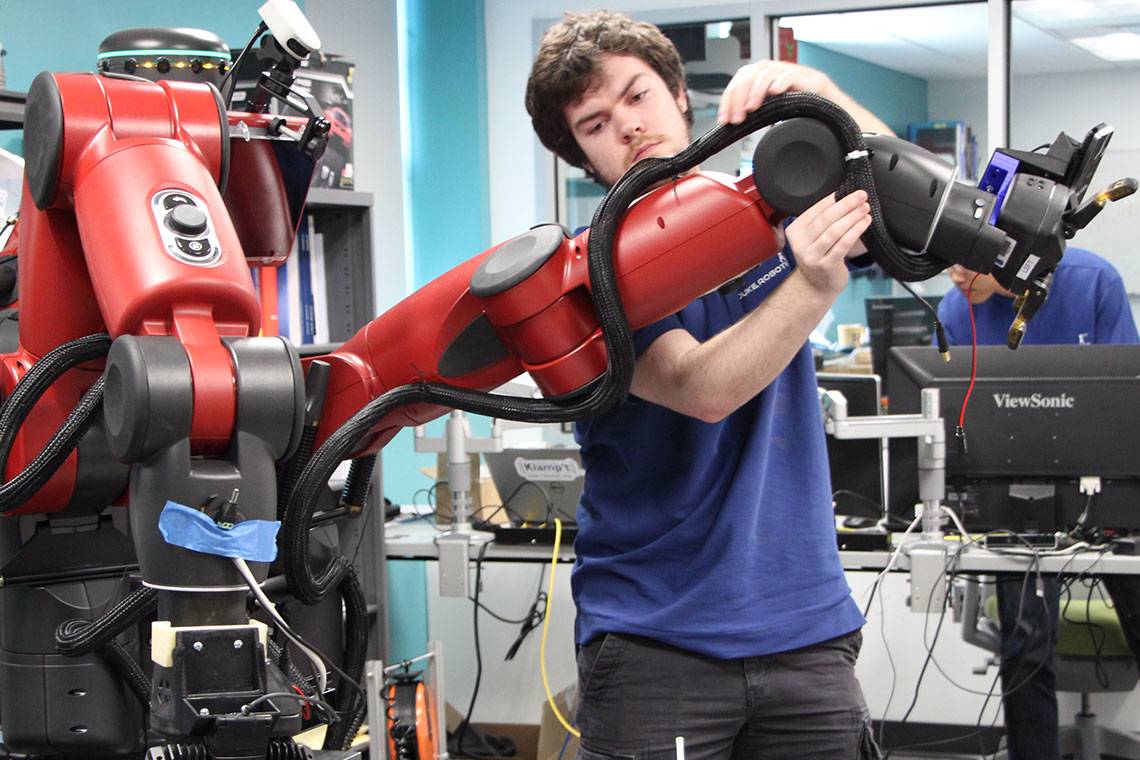
Lab members adjust the arms on a robo-nurse, TRINA, in the Duke Robotics lab during the Duke Robotics Student Symposium.
In recognition of Labor Day, we asked several Duke professors to share their thoughts on how artificial intelligence, robotics and other forces will shape the workplace of the future.
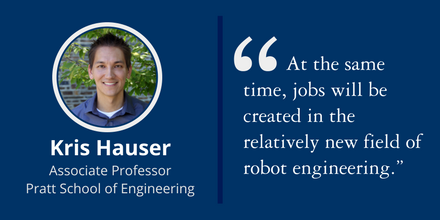 Kris Hauser, associate professor of electrical and computer engineering, Pratt School of Engineering:
Kris Hauser, associate professor of electrical and computer engineering, Pratt School of Engineering:
“As one of the fastest growing areas in technology, robotics has the potential for significant disruption to certain sectors of the workforce. Long-haul truckers and factory workers are likely to see major job cuts in upcoming decades due to technological innovations in autonomous driving and industrial automation.
“At the same time, jobs will be created in the relatively new field of robot engineering, which is currently not widely taught in universities but may one day be as common as software engineering is today.”
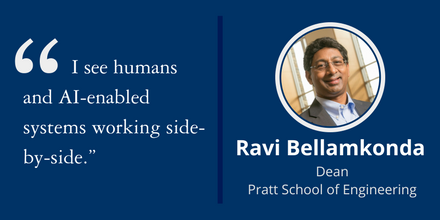 Ravi Bellamkonda, dean of the Pratt School of Engineering and professor of biomedical engineering:
Ravi Bellamkonda, dean of the Pratt School of Engineering and professor of biomedical engineering:
“I think the jobs of the future will have a heavy bias toward roles that involve creative problem-solving and interacting with diverse teams, which helps teams have rich solution sets. Jobs that don’t involve creative solutions and don’t require the ability to work with incomplete information are in danger of being automated.
“I see humans and AI-enabled systems working side-by-side, just as we use computers and other devices to assist us today.
“I also think future work will involve knowledge of and comfort with technology no matter what field – from health care to art to humanities to computing.”
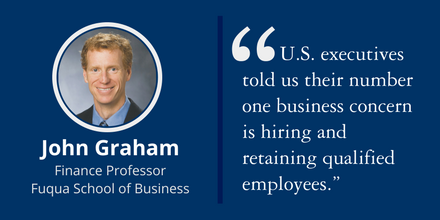 John Graham, finance professor, Fuqua School of Business, and director of the Duke CFO Global Business Outlook survey:
John Graham, finance professor, Fuqua School of Business, and director of the Duke CFO Global Business Outlook survey:
“This past quarter, for the first time in 21 years, U.S. executives told us their number one business concern is hiring and retaining qualified employees. Their emphasis on hiring, despite geopolitical turmoil and economic uncertainty, highlights just how tight the labor market is becoming.
“U.S. companies seek employees with specific skills, such as white-collar accountants, construction workers who can wield a blow-torch and factory workers who can program an assembly line of robots. CFOs also say critical thinking skills are in short supply among applicants. Even as the labor market tightens and wage pressures mount, U.S. companies would like to hire robustly over the next year, if they can find the right workers.
“We do see low-skill workers being displaced by technology, but we won’t know for another decade or two the extent to which AI and robots will displace human workers.”
 Vince Conitzer, professor of computer science, economics and philosophy
Vince Conitzer, professor of computer science, economics and philosophy
“At this point, AI is especially good at accomplishing repetitive tasks in predictable environments, with clear quantitative measures of success. Such tasks are not necessarily restricted to lower-income jobs.
“However, what AI currently lacks is a broad and commonsense understanding of the human world. Because this comes so naturally to us, it is easy to overlook that it is an essential component of many jobs. In general, today's AI may be more likely to take over some tasks versus entire jobs.”
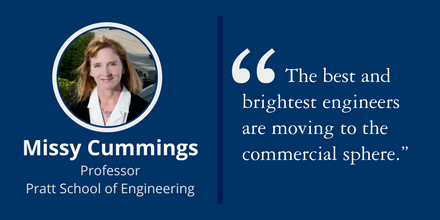 Missy Cummings, professor of mechanical engineering and materials science, Pratt School of Engineering:
Missy Cummings, professor of mechanical engineering and materials science, Pratt School of Engineering:
“The private sector is investing more and more on research and development of autonomous systems, particularly driverless cars, greatly outspending the military in this area.
“As a result, the best and brightest engineers are moving to the commercial sphere. Also, a limited number of universities are graduating students in robotics and related fields, so there is fierce competition for highly qualified personnel.”
![“It [disintermediation] takes transactions where there was once a middleman ... and allows the consumer to do it directly.” ~Ronnie Chatterji, Associate Professor, Fuqua School of Business](/sites/default/files/legacy-files/styles/story_body/public/labor-day-chatterji.png?itok=SalxQ8FF) Ronnie Chatterji, associate professor, Fuqua School of Business:
Ronnie Chatterji, associate professor, Fuqua School of Business:
“One of the biggest economic changes of the last generation was the transition to a service-based economy in the United States. Now the service economy itself is changing, as a wave of ‘disintermediation,’ or cutting out the middleman, sweeps through retail, finance, real estate, hospitality and other industries.
“Think about the last time you booked an airline ticket. Did you speak to a travel agent, or did you use a site like Kayak or Travelocity and do it yourself? That is how disintermediation works. It takes transactions where there was once a middleman, such as travel bookings, buying insurance and wealth management, and allows the consumer to do it directly.
“Will financial advisers face the same fate as travel agents? Will most people still rely on trusted advisers to help them buy complex products like insurance or a home, even when the tools exist to let them do it on their own? The answer to these questions will determine the fate of millions of service economy employees for many Labor Days to come.”